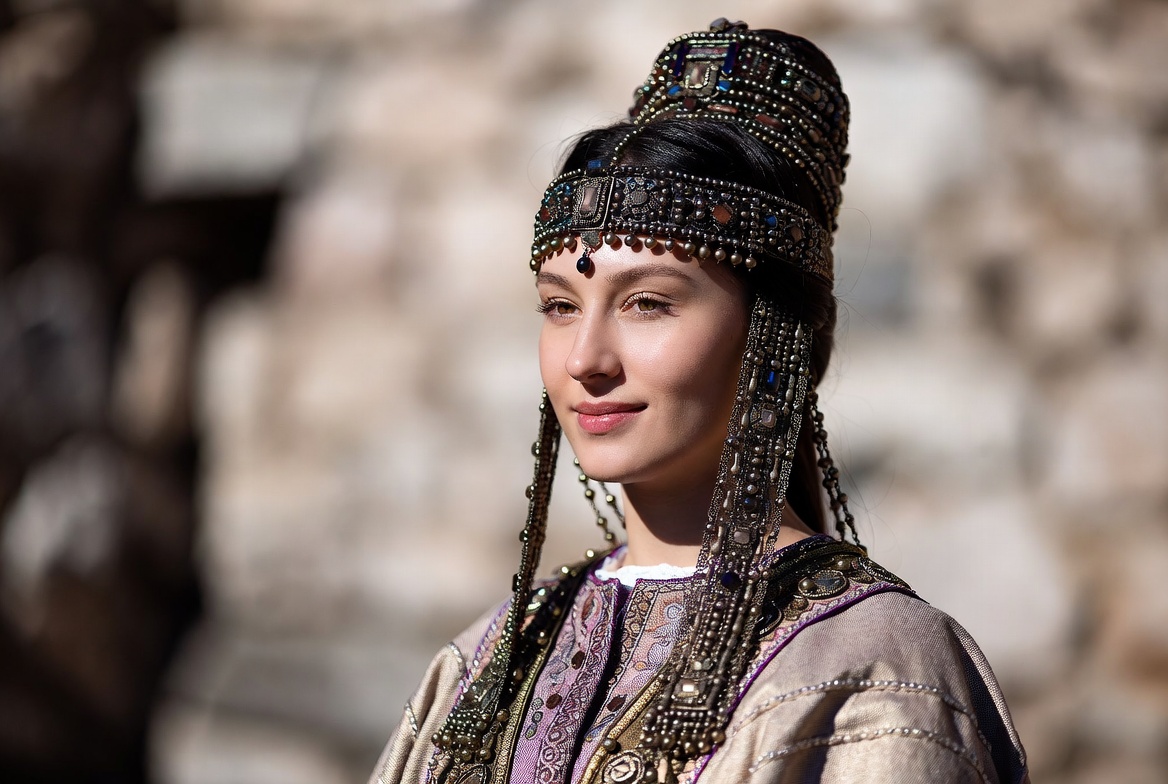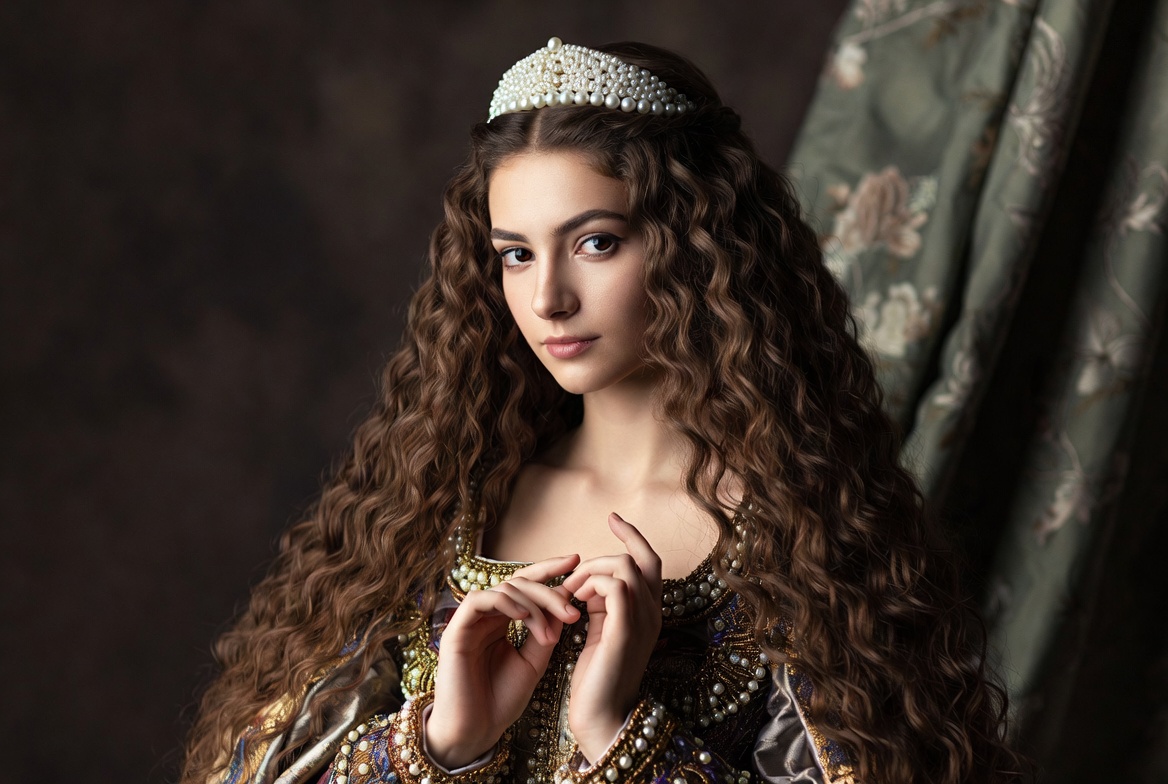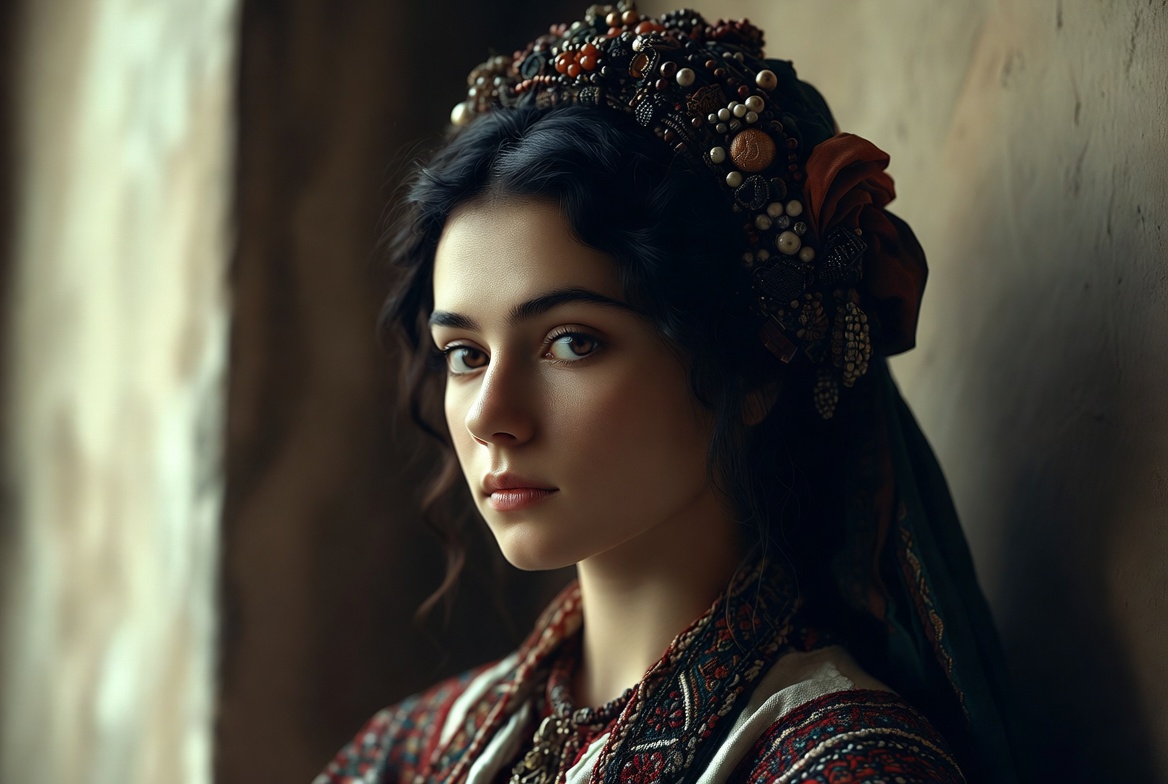Slavic Women in Ukrainian History: Famous Slavic Women
Last updated on February 22, 2026

When reading history books, we usually learn about princes, kings, and famous generals. These people conquered lands, ruled states, and changed the world. And they are all men. So where were the women? Why is it that we hear almost nothing about Slavic women in history? How can we find the trace of the half of the country left behind?
The spouses' absence of children has always been interpreted as a tragedy. In traditional societies, the responsibility for the absence of children in the family was assigned primarily to the wife, despite the fact that, as is now well known, a man and a woman take an equal part in the conception of a child, and infertility can be both male and female.
- ⏩ This stereotypical idea that the guilty woman is to blame for the childlessness of the family is obviously explained by the ability of the female body to become pregnant, bear, give birth, and milk a child, so the burden of responsibility fell on the woman. In addition, if a childless man could realize himself and prove his worth and significance in other areas — war, government, religion, power, etc., then these areas were closed to women. Consequently, motherhood as the "main female destiny" is usually a significant factor in obtaining high social status and respect in society.
- ⏩ Once upon a time, there were no schools or nannies for children. After giving birth to a child, the mother devoted all her energy and free time to raising the baby. It wasn't the same in families as it is now, but eight to ten children! So the woman watched her sons and daughters continuously. As a rule, from the age of five to seven, children already perform household work, a specific occupation corresponding to a certain age of the child.
- ⏩ The girls were instructed to look after small children, sweep the house, clean up the dishes, etc. Teenage girls were gradually taught the main female occupation — sewing and embroidery. There were jobs that children of both sexes were still involved in, such as picking mushrooms and berries.
- ⏩ So, from childhood, children learn the division into socio-gender roles through work and labor education. In the family upbringing of the child, the continuity of professional knowledge and training in trades and crafts was important. If the mother was a weaver, then she tried to pass on to her daughter all the secrets of the weaving craft. This tradition formed the basis for the hereditary transfer of professional skills from parents to children, which contributed to the emergence of dynasties and the creation of art centers.
- ⏩ Of course, there was no time for training or self-development. Nevertheless, there are many outstanding women in the history of Ukraine who were not only good mothers and housewives but also did great deeds.
Famous Slavic Women

⚜ Sainted Ukrainian Princess Olga.
Saint Olga of Kyiv (also known as Saint Olga of Kyiv, in Ukrainian: Свята рівноапостольна княгиня Ольга, or Olga the Equal-to-the-Apostles) is one of the most revered figures in Ukrainian and Eastern Orthodox history. She stands as a powerful symbol of strength, wisdom, vengeance, and ultimately spiritual transformation — the first ruler of Kyivan Rus' to embrace Christianity and pave the way for its official adoption by her grandson, Saint Vladimir the Great.
Born around 890–925 (exact date uncertain), likely in Pskov (then part of the lands connected to Kyivan Rus', now in modern Russia) or nearby areas, Olga (original Scandinavian name Helga, meaning "holy" or "blessed") married Prince Igor of Kyiv in the early 10th century. Igor, son of the legendary Rurik, ruled the emerging state of Kyivan Rus' — a federation of East Slavic tribes with Viking (Varangian) roots, centered in what is today Ukraine.
Olga's life dramatically changed in 945 when her husband was brutally killed by the rebellious Drevlians (a Slavic tribe) while collecting tribute. As regent for their young son Sviatoslav (who was only about 3 years old), Olga assumed full control of the principality from 945 to around 964. Her regency is remembered for both ruthless justice and wise governance.
According to the Primary Chronicle (Povist' mynulykh lit), Olga exacted a legendary and brutal revenge on the Drevlians in four stages:
- She tricked and buried alive the Drevlian envoys who proposed marriage to her (to absorb Kyiv into their power).
- She burned a second delegation alive in a bathhouse.
- She invited Drevlian leaders to a funeral feast for Igor and had them massacred.
- Finally, she besieged their main city, Iskorosten (now Korosten), and — in a famous ruse — demanded tribute of birds (sparrows and pigeons) from each household. She then tied burning tinder to the birds' legs; when released, the birds flew back to their nests in the wooden city, setting it ablaze and leading to its destruction.
These acts, while violent by modern standards, secured her authority, crushed rebellion, and demonstrated her cunning intelligence in an era of constant threats.
After stabilizing the realm, Olga focused on reforms: she established fixed tribute collection points (pogosti), improved administration, and strengthened trade ties. In 957, she made a historic visit to Constantinople, where she was received by Emperor Constantine VII Porphyrogenitus. There (or possibly earlier), she converted to Orthodox Christianity, taking the baptismal name Helena (Olena in Ukrainian) — in honor of Saint Helena, mother of Constantine the Great.
Though her son Sviatoslav remained pagan and resisted her efforts to Christianize Rus', Olga's influence endured. She built churches and promoted the faith quietly. Her grandson Vladimir I, baptized in 988, made Christianity the state religion, fulfilling what she began.
Olga died on July 11, 969, in Kyiv. She was buried according to Christian rites. Her incorrupt relics were later venerated, and she was formally canonized by the Orthodox Church (likely in the 13th–14th century, with official recognition in 1547). She holds the title Equal-to-the-Apostles for her pioneering role in bringing Christianity to the East Slavs. In the Catholic Church, she is also venerated as a saint. Her feast day is July 11 (June 24 in the old calendar).
Today, Saint Olga is especially honored in Ukraine as a patron of widows, converts, and a symbol of feminine strength and national resilience. Monuments to her stand in Kyiv and other cities, and her icons are widespread in Orthodox churches.

⚜ Roksolana (Anastasia Lisovska).
Roksolana (also known as Hürrem Sultan, and in Ukrainian tradition often called Anastasia Lisovska or Nastya Lisovska) is one of the most extraordinary and influential women in world history. Born around 1505 in the town of Rohatyn (now in western Ukraine, then part of the Ruthenian lands under the Kingdom of Poland), she rose from enslavement to become the legal wife of Suleiman the Magnificent, the greatest sultan of the Ottoman Empire, and one of the most powerful figures during the era known as the Sultanate of Women.
Her early life is shrouded in mystery and legend, with limited contemporary records. According to widely accepted historical accounts, she was born into a Ruthenian (East Slavic, Orthodox Christian) family — possibly the daughter of a priest. Her original name is debated: European sources often referred to her as Roxelana (derived from "Ruthenian" or "Rus'", meaning "the Ruthenian woman"), while in Ukrainian folklore and later literature she became Anastasia Lisovska (though scholars note this name first appeared in 19th-century fiction and may stem from romanticized stories rather than primary documents). In Turkish, she was renamed Hürrem, meaning "the cheerful one" or "joyful," reflecting her lively personality.
Around her mid-teens (likely in the 1510s–1520s), during one of the frequent Crimean Tatar slave raids that devastated Eastern Europe, she was captured, sold through the Crimean slave trade, and transported to Constantinople (now Istanbul). There, she entered the imperial harem as a concubine. The harem was a complex institution — not merely a place of sensuality, but a school of politics, etiquette, education, and intrigue.
Hürrem quickly distinguished herself through intelligence, wit, charm, and resilience. She caught the eye of the young Sultan Suleiman (who ascended the throne in 1520), becoming his favorite (haseki sultan). Breaking strict Ottoman traditions — where concubines typically bore only one son and were then sent away with him — Hürrem bore Suleiman at least six children: sons Mehmed, Abdullah (who died young), Selim (future Selim II), Bayezid, Cihangir, and daughter Mihrimah Sultan. This unprecedented continuity of favor shocked the court.
Even more revolutionary: Suleiman legally married her (around 1533–1534), freeing her from slavery and making her his official wife — the first (and one of the only) such marriage for an Ottoman sultan to a former concubine. This act defied centuries of custom and elevated her status dramatically.
As Haseki Hürrem Sultan, she wielded immense influence:
- She advised Suleiman on state matters and corresponded with European rulers (including Polish King Sigismund II Augustus and others), acting almost as a diplomat.
- She patronized massive charitable works: building mosques, schools, hospitals, fountains, and the famous Haseki Hürrem complex in Istanbul.
- She played a key role in palace politics, including the elimination of rivals (such as influencing the fates of Şehzade Mustafa and grand vizier Ibrahim Pasha, though her direct involvement is debated among historians).
Her power helped usher in the Sultanate of Women, a period when valide sultans (mothers) and haseki sultans held significant sway over the empire.
Hürrem died on April 15, 1558, in Topkapı Palace, likely from illness (possibly a chronic condition), probably at the age of 50-56 yo. Suleiman mourned her deeply, composing poems in her memory, and she was buried in a grand tomb adjacent to his own in the Süleymaniye Mosque complex.
In Ukraine today, Roksolana is celebrated as a national symbol of resilience, intelligence, and feminine strength — a woman from Ukrainian lands who shaped one of history's greatest empires. Monuments, novels (like Pavlo Zahrebelny's famous Roksolana), operas, and TV series (including the global hit Muhteşem Yüzyıl) keep her legend alive. Her story bridges East and West, slavery and sovereignty, showing how one woman's extraordinary journey could alter the course of empires.
These historical portraits and depictions capture the regal, enigmatic image of Hürrem Sultan (Roksolana) as seen in European and Ottoman art — often with her signature elaborate headdress and jewelry, embodying both her Eastern European roots and Ottoman grandeur.

⚜ Marusya Churai.
Marusya Churai (also known as Маруся Чурай or Maria Churai) is one of the most beloved and enduring figures in Ukrainian cultural memory — a legendary poet, folk singer, and composer of the 17th century, often called the "Ukrainian Sappho" for her poignant, heartfelt lyrics. She embodies the tragic beauty of Ukrainian folk tradition: themes of unrequited love, betrayal, Cossack life, separation, and deep emotional sorrow, all wrapped in haunting melodies that have become part of the national soul.
According to widespread legend (though no direct documentary evidence of her existence has been found, making her a semi-mythical or folkloric figure), Marusya was born around 1625 in Poltava (then part of the Polish-Lithuanian Commonwealth, now in central Ukraine). She was said to be the daughter of Hordiy (Gordiy) Churai, a Cossack sotnyk (captain) who participated in anti-Polish uprisings (including the Ostryanyn Rebellion of 1638) and was executed by burning in Warsaw as a rebel. After her father's death, young Marusya grew up with her mother in Poltava, near the Vorskla River and the Khrestovozdvyzhenskyi Monastery.
The tragic love story at the heart of her legend is dramatic and Shakespearean in its intensity: In her youth, the beautiful and talented Marusya fell deeply in love with Hryts (Hrytsko) Bobrenko (or Hryts Ostapenko in some versions), the son of a Poltava regiment khorunzhy (standard-bearer). They secretly became engaged. When the Khmelnytsky Uprising began in 1648, Hryts went off to war, promising to return. Marusya waited faithfully for four long years, composing songs filled with longing and hope.
But upon his return, Hryts had changed — he fell in love with another woman (often named Hannusia from a wealthy family) and abandoned Marusya. Devastated by betrayal, in a fit of despair, she prepared a poisonous herb (zillya), intending to end her own life. Tragically, Hryts drank it by mistake and died. Marusya was accused of murder, tried, and sentenced to death. According to the most romantic versions of the legend, she was pardoned at the last moment by Hetman Bohdan Khmelnytsky himself, who recognized her talent and the injustice of her suffering. Some accounts say she then withdrew to a monastery to live out her days in quiet atonement; others claim she died young, around 1650–1653.
Whether historical or not, Marusya Churai is credited in folklore with authoring (or inspiring) dozens of classic Ukrainian folk songs that are still sung today. Among the most famous attributes attributed to her:
- "Oi ne khody, Hrytsiu, tai na vechornytsi" ("Oh, don't go, Hryts, to the evening gatherings") — a warning to lovers, known internationally in adaptations as "Yes, My Darling Daughter".
- "Viiut vitry, viyut buini" ("The winds are blowing, the fierce winds") — a lament of separation and longing, famously used by Ivan Kotliarevsky as the opening aria in his play Natalka Poltavka.
- "Kotylysia vozy z hory" ("The wagons rolled down the hill").
- "Za svit vstaly kozachenky" ("The Cossacks rose at dawn").
These songs capture raw emotion with simple yet profound poetry — perfect expressions of the Ukrainian lyrical tradition.
Her legend has inspired generations of Ukrainian writers and artists:
In the 19th century, Poets like Levko Borovykovsky, playwright Mykhailo Starytsky, and novelist Olha Kobylianska (whose V nediliu rano zillya kopala / "On Sunday Morning She Dug Up Herbs" draws directly from the theme).
In the 20th century, Lina Kostenko's masterful historical novel in verse, Marusia Churai (1979) brought her fully to life as a complex, resilient woman — a work that won the Shevchenko Prize and became a modern Ukrainian classic.
Monuments: A striking statue of Marusya Churai stands in front of the Poltava Academic Music and Drama Theater named after Mykola Gogol (unveiled in 2006) — the only monument to her in Ukraine.
She has appeared on Ukrainian stamps and in cultural commemorations, especially around her 400th birth anniversary in 2025.
Marusya Churai — real woman or powerful cultural archetype — remains a symbol of feminine creativity, suffering, and unbreakable spirit in Ukrainian history. Her "voice" lives on in every performance of those timeless folk songs, reminding us how deeply personal pain can become eternal art.

Comments